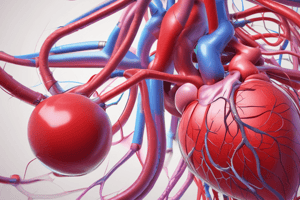Podcast
Questions and Answers
What are the three main components of the cardiovascular system?
What are the three main components of the cardiovascular system?
- Heart, Blood Vessels, and Blood (correct)
- Blood, Veins, and Arteries
- Heart, Blood Pressure, and Resistance
- Heart, Lungs, and Blood
Define blood flow, blood pressure, and resistance.
Define blood flow, blood pressure, and resistance.
Blood flow: volume of blood through a vessel; Blood pressure: force exerted by blood on vessel walls; Resistance: opposition to flow due to friction.
Blood will travel from areas of ________________ to areas of _______________.
Blood will travel from areas of ________________ to areas of _______________.
high pressure, low pressure
What two factors will increase blood flow?
What two factors will increase blood flow?
List the three factors that affect blood flow's resistance.
List the three factors that affect blood flow's resistance.
All blood vessels begin and end at the?
All blood vessels begin and end at the?
Differentiate between arteries and veins.
Differentiate between arteries and veins.
Where are capillary beds located?
Where are capillary beds located?
How does the structure of capillaries dictate their critical function?
How does the structure of capillaries dictate their critical function?
What key role do the venous valves play?
What key role do the venous valves play?
Summarize the location of the heart in the human body.
Summarize the location of the heart in the human body.
What is not completely anatomically accurate about where we are taught to place our hand during the national anthem?
What is not completely anatomically accurate about where we are taught to place our hand during the national anthem?
Explain the roles of the pericardium and pericardial cavity in the function of the heart.
Explain the roles of the pericardium and pericardial cavity in the function of the heart.
Which layer of the heart is responsible for contraction?
Which layer of the heart is responsible for contraction?
How does your heart utilize pressure gradients to circulate blood?
How does your heart utilize pressure gradients to circulate blood?
Why would the ventricles need thicker walls for contraction than the atria?
Why would the ventricles need thicker walls for contraction than the atria?
Differentiate between the roles of the superior vena cava and inferior vena cava.
Differentiate between the roles of the superior vena cava and inferior vena cava.
Differentiate between the roles of the pulmonary trunk and aorta.
Differentiate between the roles of the pulmonary trunk and aorta.
Differentiate between the roles of the atrioventricular and semilunar valves.
Differentiate between the roles of the atrioventricular and semilunar valves.
Flashcards are hidden until you start studying
Study Notes
Components of the Cardiovascular System
- Main components: heart, blood vessels, and blood.
Blood Flow Dynamics
- Blood flow refers to the volume of blood through vessels or circulation.
- Blood pressure is the force exerted by blood on vessel walls, measured in mmHg.
- Resistance measures friction between blood and vessel walls, opposing blood flow.
Pressure Gradient
- Blood flows from regions of high pressure to areas of low pressure.
Factors Influencing Blood Flow
- Increased blood flow results from higher resistance and pressure.
- Resistance is affected by blood viscosity, vessel length, and diameter—lower resistance enhances blood flow.
Blood Vessel Structure
- All blood vessels connect at the heart, forming a closed loop.
- Arteries carry blood away from the heart; veins return blood to the heart.
Capillaries
- Capillary beds are located throughout all body tissues.
- Capillaries have thin walls for efficient exchange of materials.
Venous Valves
- Venous valves prevent backflow of blood in veins, crucial in limbs where gravity affects circulation.
Heart Location
- The heart is centrally located behind the sternum.
- For accuracy, place the hand under the left breast, as opposed to the traditional hand-over-heart position.
Heart Protection and Function
- The pericardium protects and anchors the heart.
- The pericardial cavity contains serous fluid, facilitating heart contractions.
Heart Muscle Layer
- The myocardium is the muscular layer responsible for heart contractions, composed of muscle tissue.
Circulation Mechanism
- The heart operates as a pump, utilizing pressure gradients to circulate oxygen-rich blood efficiently.
Ventricle Wall Thickness
- Ventricles have thicker walls than atria to generate higher pressure for blood ejection to the body.
Major Veins
- Superior vena cava collects blood from above the diaphragm.
- Inferior vena cava collects blood from below the diaphragm.
Arterial Function
- The pulmonary trunk delivers deoxygenated blood to the lungs.
- The aorta distributes oxygenated blood to the body's tissues.
Heart Valves
- Atrioventricular valves prevent backflow into the atria.
- Semilunar valves prevent backflow into the ventricles.
Studying That Suits You
Use AI to generate personalized quizzes and flashcards to suit your learning preferences.




